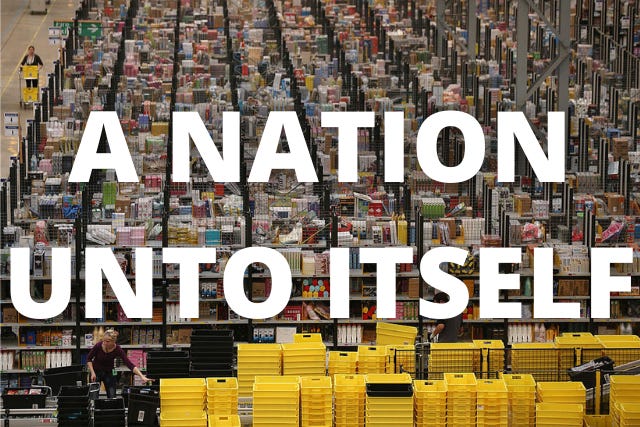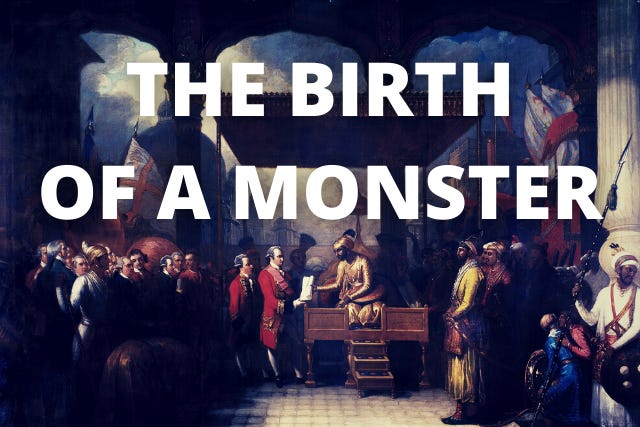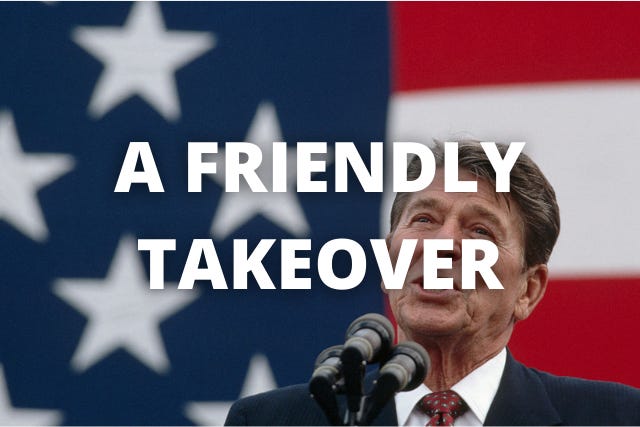A Nation Unto Itself
The Right's push to redistribute wealth from the bottom up and establishment of hypercapitalism has created a dangerous system where corporations have grown beyond the nation states that birthed them
To talk about Amazon is to try and describe something without the necessary language.
Is it a monopoly? Certainly, but it’s something more than that. Something that we have caught glimpses of in the past, something that feels both alarmingly familiar and increasingly upsetting. It is only observable in blurring increments for to see this thing in full, to recognize what it is, what it represents, and what it could possible still become is to hand yourself over to debilitating horror.
Coverage of Amazon tends to this problem by zeroing in on developing, or rather readily apparent, issues, including the fight for employees to unionize despite overwhelming press, and, as of late, the upsetting frequency with which its employees, forced to work beyond human limits in the name of neverending profit and by inhuman artificial intelligence and calculated figures, have resorted to urinating and defecating in bottles and bags. In the past, these stories have concerned even more tragic circumstances, including an employee who died in a warehouse and was left on the floor for over twenty minutes while coworkers were ordered back to work.
It is not enough to say this is unethical or evil or that Amazon has grown to dangerous stature and power. Those words do not even begin to wrestle with the real implications of what Amazon, and a handful of other corporations, have grown into and what they are still busily evolving into at this very moment. To properly reckon with what we are seeing, with what future we are currently barreling toward, we must begin to piece together the origins of this awful, awful thing and name the unnameable.
Dispatches From A Collapsing State is the home for Jared Yates Sexton’s political, cultural, and historical writings and is an independent project that depends on your support. If you enjoy Jared’s writings, and want access to all pieces and features, including Q&A’s where you can ask Jared your questions, please consider becoming a subscriber.
The origin of the modern corporation is tied explicitly to the rise of capitalism. Wrapped up in developing utopianism that accompanied both the Renaissance and the discovery of the “New World,” corporations were created as an extension of the state, an organ that could operate in the name of a kingdom, serve the interests of the nobles and merchant class, and carry out the ugly business of colonization and human slavery. They were built, literally, to traffic human beings for the purposes of exploitation, to force native populations into labor while systematically and cruelly destroying their communal bonds and culture.
Over time, these corporations grew in size and scope. In operating international and systematic exploitation, they fielded navies and armies that oftentimes dwarfed those of their supporting nations. They were given the right to declare war, execute martial law and capital punishment against slaves and natives, and ruthlessly destabilized entire continents in order to extract their resources, acquire new slaves, and pad their profits. These corporations enjoyed almost limitless powers, and the nations, ensconced in this new economic system, would be drug into one war after another over extraction of resources and pursuit of profit, sacrificing the lives of innocent young men who stood to gain almost nothing from the plunder and cruelty.
In India, the British East-India Company, backed by its own armies and the full power of the British Empire, ruled the kingdom through a series of puppet-leaders and plotted the continued theft of the people’s resources from a boardroom over four thousand miles away. All that mattered was profit. Once unleashed, the corporation may have been linked to its birthing power, but it grew on its own, exercised its own control, and, in many cases, rivaled nations in stature.
The trend of corporations dragging birthing nations into war did not end in the 16th or 17th centuries. To sift through history and its war is to glance at violence done on behalf of protecting and extending the profits of corporations that stand as monopolies within their respective markets. War is so often given a veneer of nationalism and coated in flag-waving mythology, but it is the process by which the wealthy and powerful negotiate their economic differences.
Perhaps no one has been more adept at laundering the greed of corporations and the wealthy through the prism of “patriotism” than Ronald Reagan. As the fortieth President of the United States, Reagan was a born salesman who pitched a re-invigoration of the American Dream and American Exceptionalism. What he sold the people, however, was a complete economic shift that destroyed the consensus of post-New Deal America and began an aggressive campaign to redistribute wealth from the bottom up.
Reagan, as an avatar for a conservative project obsessed with changing the American story in an effort to author a new hypercapitalistic direction, countered the polices of Franklin Delano Roosevelt and each succeeding president, defeated the honest, but somber message of Jimmy Carter, who warned Americans that greed and division would lead to “a certain route to failure”, and presided over an America that jumped into greed, individualism, and economic cruelty with both feet.
The effect was grotesque. Reagan’s backers shredded the social safety net, dismantled government as a means of public good, created an environment and prevailing philosophy that idolized wealth and vilified the impoverished, and handed corporations a new world where they would pay little to no taxes and consolidate as much power as they might want. Years later, fearing electoral oblivion, the Democratic Party would come to see Reaganism and the new economic consensus as unbeatable, and embrace a strain of the same philosophy. The establishment of globalism meant that corporations could span continents, avoid societal responsibilities, bypass even meager minimum wages and benefits, hoard their wealth, dominate markets, and begin to grow into something novel and terrible.
To begin talking about what corporations like Amazon are becoming, we must, again, reiterate what they were. Extensions of the state meant to expedite exploitation on behalf of the state and its wealthy few. In doing so, however, they turned into their own state-like beings focused only on furthering their own wealth and influence. When necessary, they relied on the power and size of the state, but were also fine working on their own when the situation called for independence.
It is also necessary to explain that our current system of nation states is merely a blip on the radar of history. Before them, there were kingdoms interlocked by relationships and tied together via wars and struggle. Before them, there was empire. It is, to put it mildly, a constantly changing reality that we have been made to feel as if it is permanent and unchangeable.
Right now, individual corporations enjoy wealth that is either equal to or larger than sovereign states around the world, a staggering fact that only grows more disturbing as you realize corporations, in the pursuit of profit, use nation states’s welfare programs as a means of paying their workers less wages. In carrying out the business of government, states like America have begun relying on these corporations, leading to a troubling interconnectedness in economics, politics, law enforcement, technological infrastructure, and national defense. While collecting huge contracts from the federal and state governments, these corporations have mastered the fine art of avoiding paying their fair share of taxes, depriving schools of funding, denying people healthcare and social programs, and leaving our infrastructure a crumbling disaster.
In addition, corporations have bought and sold our politicians, either through donations or partnering with them in carrying out their electoral strategies, leading to a moment where it is almost impossible to tell where these companies end and the government begins.
Knowing that reality is malleable, that we are not necessarily destined to live in nation states, that things do change and evolve, and that these systems are expressly and deliriously coordinated to aid in the growth and influence of corporations, there is no telling where this might go. The obscenely wealthy have bragged about their bizarre schemes, including shoving us all into virtual reality so they can get beyond the problem of democracy or lifting off in rockets to a libertarian kingdom on Mars, but even those outlandish, although possible, scenarios give us only an idea of what we are dealing with.
Considering all of this, when piecing together the disparate elements, the history and the present, when glancing into the future with one eye on today, what we see is that corporations like Amazon were birthed in order to carry out the business of states, but have instead used those states as a means to change, to grow, to carry out the nasty business of metamorphosis. They have come to view states as a means to an end, a step in their evolution.
We may very well be living in the last days of a recognizable nation state reality. We may very well be living in the anxious few moments before this new creature escapes its shell transformed, stretches its filthy wings, and takes flight.








One of the only organizations that I know of working to dismantle the death grip of corporations from the bottom up (except for Move to Amend, which is trying to get a constitutional amendment passed declaring that corporations are not people) is Community Rights U.S.: https://communityrights.us
I think it started in Pennsylvania when people -- many of them thinking of themselves as conservative -- were shocked to find that they and their communities had no power to stop fracking under their homes, schools, etc., and that their legislature in this matter was against them and for the corporation. Their newsletter tends to be a very interesting rundown of the battle between corporate and human interests throughout American history, and they keep making the point that corporate charters are technically revokable, though nobody in power is interested in doing that.
(I wrote a piece a while back about the British East India Company and the sense that one of our only tools to dismantle modern equivalents comes from local community-oriented groups: https://antonia.substack.com/p/the-east-india-company-and-the-power
Necessary though not sufficient conditions.)
What do you think of the “techno-feudalism” label that’s being used by some people to name what you’re describing? Some have argued, “It’s not feudalism; it’s manorialism you’re referring to,” or “It’s not feudalism; it’s something new,” but I think you’re right to say that it’s both new and familiar. I was wondering if you had some insight into that from your recent research.